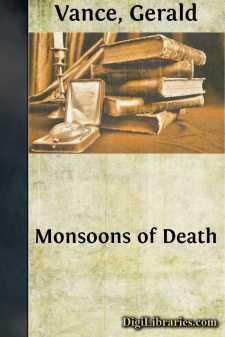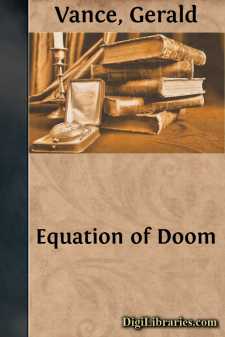Categories
- Antiques & Collectibles 13
- Architecture 36
- Art 48
- Bibles 22
- Biography & Autobiography 813
- Body, Mind & Spirit 142
- Business & Economics 28
- Children's Books 15
- Children's Fiction 12
- Computers 4
- Cooking 94
- Crafts & Hobbies 4
- Drama 346
- Education 46
- Family & Relationships 57
- Fiction 11829
- Games 19
- Gardening 17
- Health & Fitness 34
- History 1377
- House & Home 1
- Humor 147
- Juvenile Fiction 1873
- Juvenile Nonfiction 202
- Language Arts & Disciplines 88
- Law 16
- Literary Collections 686
- Literary Criticism 179
- Mathematics 13
- Medical 41
- Music 40
- Nature 179
- Non-Classifiable 1768
- Performing Arts 7
- Periodicals 1453
- Philosophy 64
- Photography 2
- Poetry 896
- Political Science 203
- Psychology 42
- Reference 154
- Religion 513
- Science 126
- Self-Help 84
- Social Science 81
- Sports & Recreation 34
- Study Aids 3
- Technology & Engineering 59
- Transportation 23
- Travel 463
- True Crime 29
Monsoons of Death
by: Gerald Vance
Description:
Excerpt
The gleaming insignia stripes on Lieutenant Ward Harrison's broad shoulders were less than two days old when he received his first assignment.
"Lieutenant Harrison," his commanding officer said, glancing from the papers he held in his hands to the young man who stood at attention before his desk, "this will be your first touch of action since you were commissioned. A lot depends on how you handle yourself."
"Yes sir," Ward answered. He straightened his already poker-straight spine. His face was young and serious and intent. There was a blaze of zeal in his blue eyes and grimness in the tightness of his jaw. But a lock of blonde hair that fell over his forehead lent an incongruously boyish cast to his grimly set features.
His commander, a Planetary Colonel, with thirty years of void experience behind him, smiled slightly and looked down at the papers in his hands again.
"Your training record has been excellent, Harrison," he said, "and I am gratified to note that you apparently realize the seriousness of our work." He leaned back in his chair, looked up at the young Lieutenant. "It took science hundreds of years to lick the problem of crossing the void of space to the outer planets. Now, that that much has been accomplished, the task of exploring and possibly developing and colonizing those planets is ahead of us. The most important part of that work is up to men like you, Lieutenant Harrison. You are attached to the meteorology department with the job of doing the preliminary analysis and exploration on the various planets whose raw materials are essential to Earth. Never for a minute underestimate the importance of that work."
Ward cleared his throat. "I won't sir."
"Good. There are other branches of the service that might seem more glamorous, but all of them are dependent on your research and findings. Without meteorological survey the entire network of space stations we have established would have been impossible. And the need today for accurate and thorough research on atmospheric conditions in the Universe is greater than ever before. Always keep that in mind."
"I will, sir," Ward answered.
"Good," the colonel said. He ran a heavy hand through his silver-dusted hair and then picked up again the sheaf of papers from his desk.
"Your first assignment is to one of our established observation stations on Mars," he said.
Ward kept his face woodenly expressionless; but it was hard to conceal his disappointment. He wanted adventure and danger. He wanted to prove his courage and loyalty on some perilous journey to an uncharted, unexplored area, and there was little hope for such action on an established base.
"The station to which you are being sent," the colonel went on, "was established three years ago by the man who is still in command there, a civilian by the name of Thomas Halliday. He is alone there, now. His assistant died about six months ago. You will act as Halliday's assistant in atmospheric experimentation and in the collection of meteorologic data. Despite the fact that he is a civilian you will take your orders from him. Is that much clear?"
"Yes," Ward said. He had to fight to keep the bitterness he was feeling from showing in his voice....



